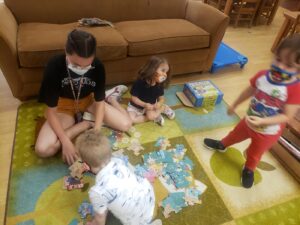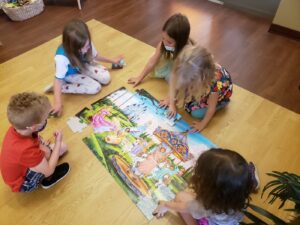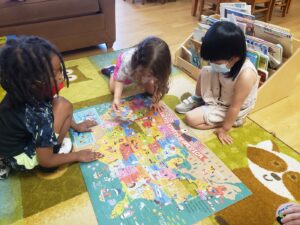
Puzzles are a favorite activity that many children and families use to pass the time. They come in a variety of themes as well as sizes, making it easy for many people, including young children to engage in. Although puzzles are fun to explore and complete, they also have significant importance when related to cognitive abilities of children in a preschool classroom.
One benefit of working with puzzles is that they help to build small muscles in the hands of young children, improving fine motor skills. Puzzles also help with hand eye coordination and problem-solving skills as children maneuver the pieces to make them fit in the correct place. Puzzles can help with learning social skills and encourages dialogue and the use of language skills as well while children work together to put together pieces.
Children worked hard to put together a United States puzzle while learning about their own state and the states that some of their loved ones live in. The puzzle contains 60 pieces which is more pieces than the preschoolers usually work with. They were up for the challenge to work together to complete the puzzle. The children thought of strategies to use to complete the puzzle such as finding all the corner pieces first and then matching the colors to see if the puzzle pieces fit together.
As the children worked to complete the puzzle, they used problem solving strategies, collaboration skills, social skills, hand-eye coordination, fine motor skills, and language skills. All these skills are very important for completing many tasks in the preschool classroom as well as future classroom settings. Completing puzzles help to develop these skills and give children the practice that they need to utilize these skills. In conclusion, puzzles are a great tool to help children grow and develop essential cognitive skills that they will use for the rest of their lives. Puzzles help develop cognition piece by piece.
(Click to enlarge)



Footer
Schoenbaum Family Center and Crane Center for Early Childhood Research and Policy
Building equitable opportunities for all young children to learn and thrive through policy, practice, research, and evaluation.
Visit the Crane Center website to learn more.

